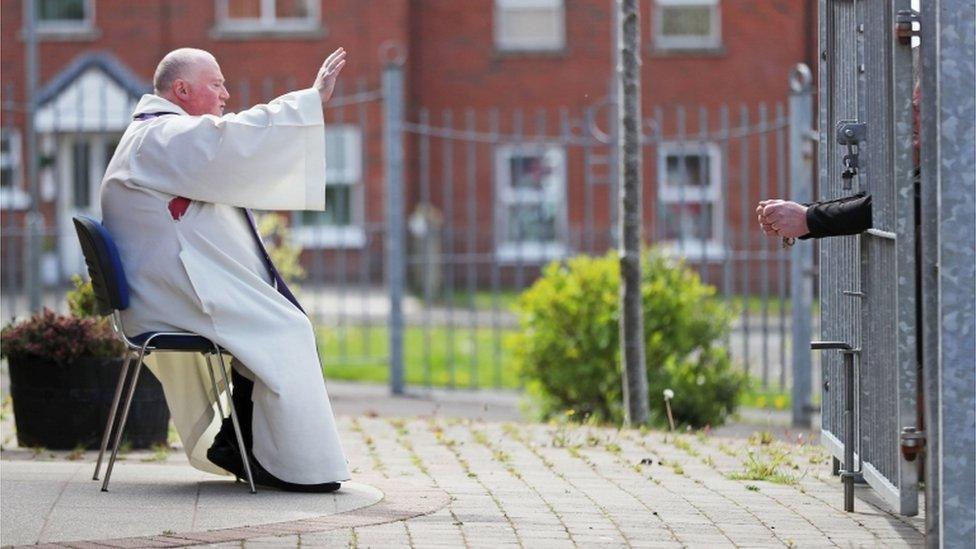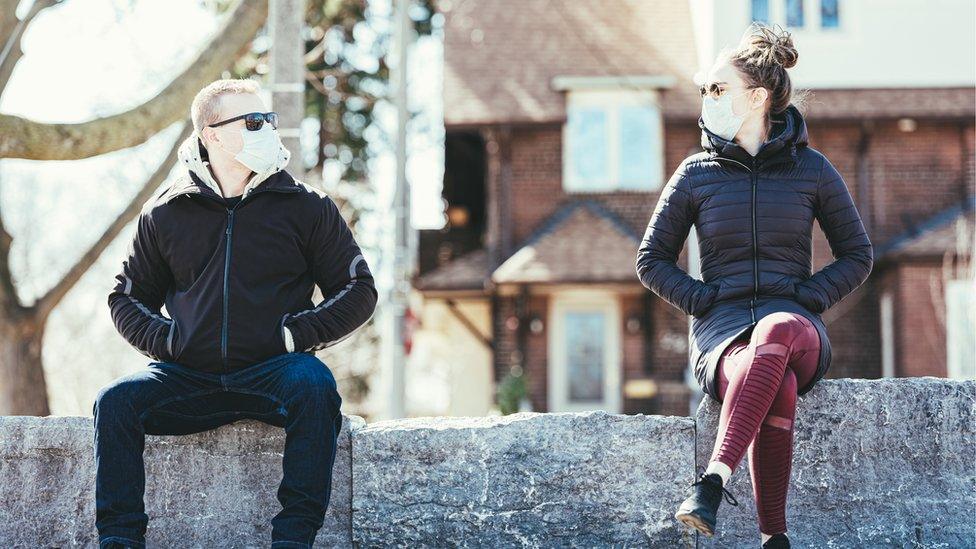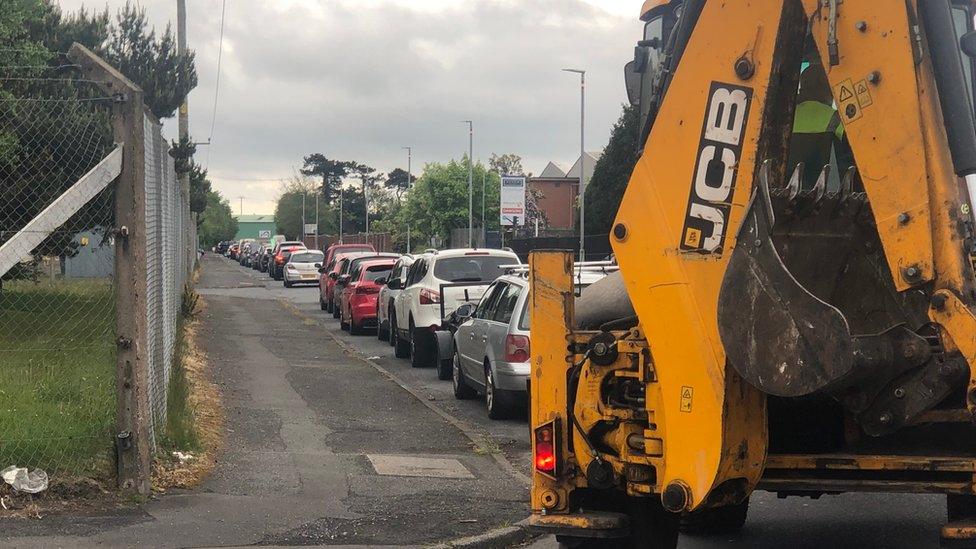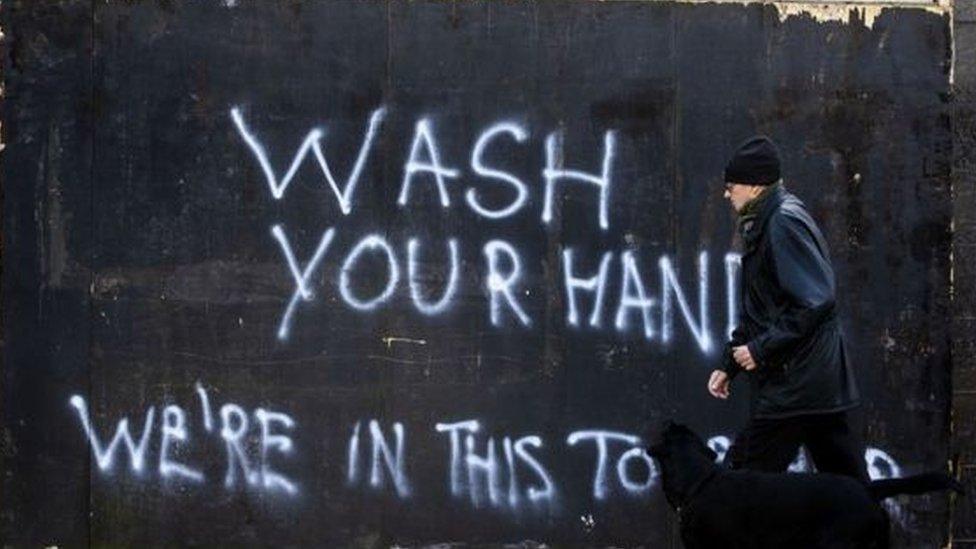Coronavirus: NI Executive will 'revisit indoor family meetings'
- Published
- comments
What does the ease in restrictions mean for people in Northern Ireland?
The executive will revisit whether people in NI can visit immediate family indoors, when it meets on Thursday, First Minister Arlene Foster has said.
Ministers agreed to ease more lockdown restrictions as part of the first step of their recovery plan, so long as social distancing is followed.
Groups of up to six people who do not live together can now meet outdoors.
Relatives who do not live together can still not meet indoors, despite this being included in step one of the plan.
A further seven Covid-19 related deaths were reported by the Department of Health, bringing its total to 489.
Four of those deaths were recorded in the past 24 hours; the other three happened earlier but have only now been added to the department's total.
A separate weekly report from the Northern Ireland Statistics and Research Agency (Nisra) recorded a total of 599 deaths by 8 May. Nisra's figures include all fatalities where coronavirus is mentioned on a death certificate.
Also on Tuesday, plans for the gradual easing of lockdown restrictions north and south of the Irish border - and the importance of implementing consistent approaches wherever possible - were discussed in a conference call.
The call was jointly chaired by NI Secretary Brandon Lewis and Tánaiste (Irish Deputy Prime Minister) Simon Coveney, with First Minister Arlene Foster, Deputy First Minister Michelle O'Neill, NI Health Minister Robin Swann and Irish Minister for Health Simon Harris all taking part.
Last week, the executive published its five-phase blueprint for recovery in Northern Ireland, but this did not have firm timetable, unlike the roadmap in the Republic of Ireland.
No hugs, please
The executive has maintained that not all aspects of each step will be implemented at the same time, and will depend on keeping the R-value - or reproduction number - as low as possible.
R refers to the average number of people that someone with Covid-19 is expected to infect after contracting the virus: The goal is to keep R under one.
Speaking at the executive's daily press conference on Tuesday, Health Minister Robin Swann said Northern Ireland's R-rate was currently between 0.7 and 0.8.
Plans were in place to publish the figure on a weekly basis, to show trends in line with some lockdown measures being lifted, he added.
The minister also urged people to comply with the executive's guidelines in order not to "throw away progress".
"Meeting close friends and family will be emotional, we will instinctively feel like giving a handshake or hug but don't - keep on keeping your distance," he said.
How many tests?
Mr Swann told the daily briefing almost 40% of residents in care homes - 4,950 people - in Northern Ireland had now been tested for the virus.
This week, his department announced universal testing of staff and residents in care homes would be completed by next month.
The minister said 4,816 care home workers had also been tested, and that contact tracing for all confirmed cases of Covid-19 began on Monday.
He added that 33 care homes which had been affected were now free of Covid-19. Last week BBC News NI learned that more than a fifth of Northern Ireland's care homes - 110 of the 484 - were caring for vulnerable older people with coronavirus or flu-like symptoms.
Overall there have been 49,891 laboratory completed tests in Northern Ireland.
All-Ireland approach?
Ahead of a meeting between NI ministers and their Dublin counterparts in Dublin on Tuesday evening, Finance Minister Conor Murphy said it was important the pandemic response was coordinated across the island of Ireland.
Plans for a contact tracing app are still to be confirmed, with Mr Swann saying his officials were "still looking to see which will be the best fit" for Northern Ireland.
Both the Republic of Ireland and UK governments are working on separate apps, but it is not clear which system Northern Ireland will use.
On Tuesday evening, Mr Swann released details about how Northern Ireland has been involved in a contact tracing pilot involving all confirmed positive cases of Covid-19.
Northern Ireland is the first part of the UK to run such a programme.
It has been operating on a five-day-a-week basis, but the service is to be expanded to operate over seven days.
"This will be a major commitment as we expect this service to be in place for the next year at a minimum," said Mr Swann.

In other developments on Tuesday:
Education Minister Peter Weir rejected an appeal from the head of the Catholic Church in Ireland for Catholic schools to "suspend" academic selection in 2020
Unemployment in Northern Ireland rose by almost 90% in April, official figures suggest
Speech therapists in NI say they are facing an "uphill battle" for increased personal protection equipment
Hospitality, tourism, leisure and childcare businesses in NI have been told they do not have to pay rates this year
The NI Executive has created a £12m fund to assist substitute teachers during the Covid-19 crisis

Friction between factions?
As the assembly debated changes to Northern Ireland's lockdown restrictions, differences of opinion arose between the DUP and Sinn Féin.
Sinn Féin's Martina Anderson welcomed news about increased testing in care homes, but said this was "too little, too late".
The DUP's Christopher Stalford accused Sinn Féin's representatives of "lashing out all round them".
He also asked why Michelle O'Neill had quoted an R number of 0.5 recently, and wondered whether that was the point when lockdown rules might be relaxed further.
'Too risky'
On Monday, the executive agreed churches and places of worship would reopen for private prayer and outdoor activities that did not involve shared contact with hard surfaces - such as golf and tennis - would be permitted.
Drive-in cinemas and drive-in music events are also now permitted.
But Mrs Foster said scientific advice provided to the executive suggested indoor visits were too risky at this time.
"There's a clear desire for people to be together but we have to make sure we take baby steps," Mrs Foster told BBC NI's Good Morning Ulster programme.
"When we have the medical advice that we can move, we will move."
The executive would revisit the matter later this week, and also explore whether "very small" weddings can be permitted, she added.

Drive-through church services will now be allowed, in line with social distancing and public hygiene guidelines
Deputy First Minister Michelle O'Neill has stressed that as soon as the advice from scientists changed, the executive would lift the restriction on visiting family indoors.
"We will get there and we'll get there sooner if we all keep doing what we're doing," she added.

EASY STEPS: How to keep safe
A SIMPLE GUIDE: What are the symptoms?
CONTAINMENT: What it means to self-isolate
HEALTH MYTHS: The fake advice you should ignore
MAPS AND CHARTS: Visual guide to the outbreak
VIDEO: The 20-second hand wash

- Published20 October 2020

- Published19 May 2020

- Published18 May 2020

- Published12 May 2020

- Published12 May 2020